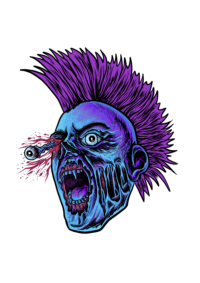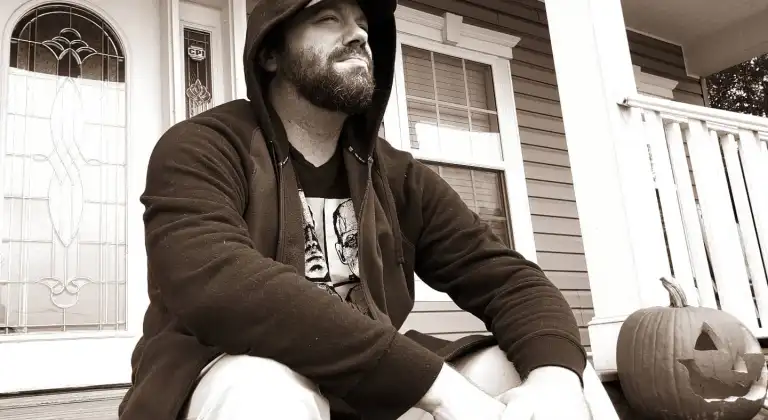
Hello Mutifreaks, we got something extra special for you this time. Horror legend Kristopher Rufty sat down with us and gave us a pretty sweet and in depth interview. We were able to ask him all sorts of questions on different things like his feelings on how the horror genre is and his own writing processes. Rufty is a legend in the indie horror community for crafting devious tales of horrific happenings. If you haven’t read his work, books like Pillowface, The Lurkers, A Dark Autumn, and of course The Devoured and The Dead (which you can find the official Mutilated Mohawk Review for here.) His work influences a genre, and here he is now for his debut Mutilated Mohawk Media interview.
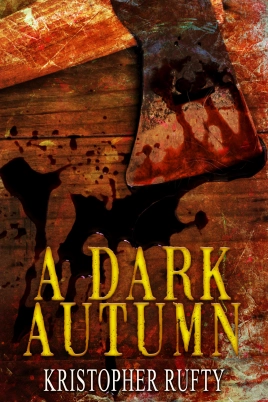
Wandering Through Terror
What are your top 3 favorite horror movies?
They change all the time, but this has been the list for years now. Fright Night. The Texas Chain Saw Massacre. Friday the 13 th .
What are your top 3 favorite horror novels?
That’s an even harder question to answer. I’ll say three that I adore, but there are so many that could easily take the top three spots because I take into consideration how much fun I had while reading the book. The Stake by Richard Laymon. Off Season by Jack Ketchum. Misery by Stephen King.
What do you feel makes horror unique to other genres? What about horror is appealing to you creatively?
Horror shows us what we’re afraid of, but in a way that’s safe. Plus, it’s a lot of fun writing about monsters and gore. Keeps the child inside of me entertained and gives me a lot to play around with.
Some people I've interviewed believe that horror is in sort of a golden age, while others believe it to have gone stale. What are your thoughts and why?
I believe horror has never gone stale. There are definite highs and lows, ups and downs, but it never has been or never will be stale. Horror is always evolving, yet somehow remains true to its roots. That’s one of the things I love about horror. You can’t get bored. There’s just no way.
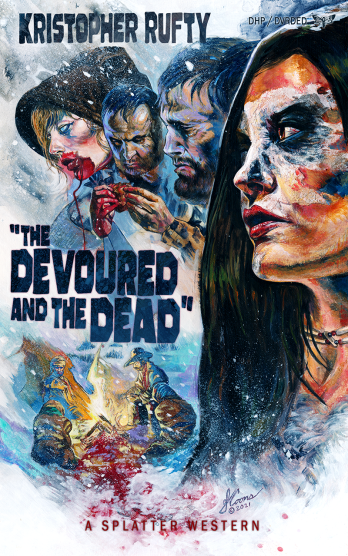
Slaughtering The Pages
You write some really extreme scenes in your novels. Do you think horror has a limit, or is everything’s game when it comes to the kind of content in the genre?
I think everything’s game if it’s natural to the story. There have been many books I’ve read that it’s easy to tell something is in the story for shock value. Shock value is okay, to an extent, but it can be overdone. Plus, if it’s there just to shock somebody, it’s easy to tell that’s what the writer put it there for. But if you find yourself writing a story and it flows to a scene where the dog is probably going to be killed, then the dog probably won’t make it. And that is tough because I love dogs. And if the story is loaded with dogs’ brutal deaths on every page, then you’re probably reading a book written by somebody who only wants to piss off the reader.
When writing, do you have certain exercises or routines that you perform to really get these high tension scenes that are in your books? What do you think the keys to writing a truly horrifying scene are?
I really try to stay away from routines. I don’t want to write under the guidelines of a formula in any way. That takes the fun away and usually stifles the creativity. Anything can make a scene horrifying to me. All it takes is adding an element that shouldn’t be there, one that can challenge the comfort zone in some way, whether it’s physical, mental, or both. To me, drama can make a scene horrifying. Not the soap opera stuff, but real human emotion and sadness, how we deal with it and how it affects us. Sometimes, the best villains are created from something dramatic or traumatic.
When it comes to your own writing routine, what does that look like? How do you plan your writing sessions and how do you go about banging out those word counts?
I’m a single dad of three, so a writing schedule is impossible. I write when I can, but I make sure it’s every day. Before I was single, I had a set schedule that I stuck to, no matter what. Now, it differs each day. It took me a while to get back to it and into a system that works, but this one is fine for now. One thing I always make sure I do are my notes sessions. I sit down with a blank page and write about the idea I have. I just type or write it out, talking about it as if I were talking to myself. In a way, I am. I’ll write up a question about it, then answer the question with whatever idea I have at the time. Then I get started on the story. Sometimes, I return and do more notes and see how far I’ve strayed from the original plan.
When coming up with ideas for some of your content, how do you personally separate the good ideas from the bad?
Some people would say I haven’t learned how to do that! But the way I look at it, the ideas kind of do that themselves once I start writing them. There are times when I just write and write, and the idea will not go anywhere no matter how much I demand it to. I’ll put it away and move onto something else. Every now and then, I’ll go back to that dead idea and read it again, only to see what the problem is right away, fix it, and complete it. That’s happened years after I abandoned it before. Other times, the story remains dead.
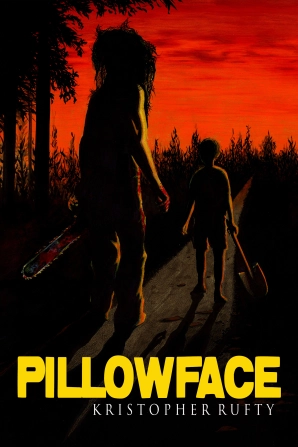
Weapons of The Slasher
A Dark Autumn is an absolutely insane read, where did the idea for this novel come from? Could you discuss some of the process that led to the creation of this book?
I had just watched I Spit on Your Grave for the countless time. A friend of mine wanted to make a movie, something low budget set in one location, and a rape/revenge movie seemed like a good choice as an idea to pitch to him. Well, I didn’t want to do the same story that had been done in so many movies, so I thought about reversing the roles. I’d read an article online about two women who forced a man into sex. When I read the comments on the article, I noticed that a lot of people were claiming a man couldn’t ever really be raped. Because, in their eyes, all men would kill to be with multiple women at once. It was that aspect that really stuck with me. If a man cried rape, would anybody believe him? Well, the friend abandoned the idea of making a movie. But I still had this idea. A year or so later, a publisher asked me to submit a novella to their new novella line. So I wrote A Dark Autumn and turned it in. They rejected it. Fast. And the story sat on my computer for another year before I was able to get it published. I was afraid of backlash or hate because of the subject matter, but the book has been popular for a long time.
When it comes to horror literature, what do you look for that makes something good and memorable? What qualities in horror literature are instant turn offs for you?
I don’t know if I really look for anything. But I do prefer books that aren’t filled with someone’s dream sequences that the reader isn’t supposed to know if it’s real or not. It’s fine, overall, but sometimes that can be overplayed. I also don’t like child abuse in any way. Sometimes, a story is stronger because of a character experiencing it, but it’s hard for me to read. If something brutal seems natural in a story, then I’ll go with it. But, again, if it’s there only to insult or shock, I won’t read it.
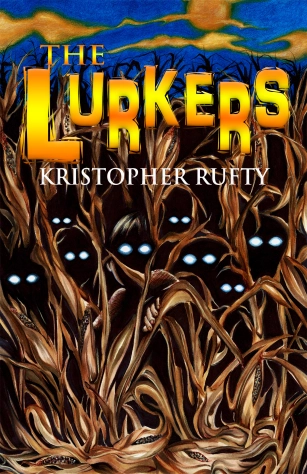
Inspiring Terror
Who inspired you when it came to writing horror?
It was movies at first. From a very young age, I’ve watched horror movies. But I have always been a reader. I started reading Stephen King when I was a kid. My father pointed me to John Saul and Graham Masterton, which led to Bentley Little. I remember I bought David Robbins’s Spook Night at a drugstore when I was a teenager and that sent me spiraling in another direction as far as writing horror goes. But it was a close friend, Trent Haaga, who put me where I am. He had recommended Jack Ketchum to me, so I picked up Off Season to read while I was recovering from surgery. I figured it’d keep me busy for a few days. I read it in a few hours. Devoured every page. It was the movies I like to watch, but in a book! Trent bought me Richard Laymon’s The Cellar because he said we had similar styles and knew I would love Laymon’s work. Trent was right. My life was forever changed. I would not be writing these books if Trent hadn’t done that almost twenty years ago.
What subgenres in horror are your favorite and least favorite and why?
I like them all, really. I don’t read a lot of ghost/haunted house books these days. That’s probably because I read so much of them growing up. I still like them, though. I’m really into the splatter stuff. Books that some might call “popcorn fiction” are just fine by me. Sometimes people complain that a book isn’t realistic enough for them. I’ll never complain about that. I don’t want to read a book that’s going to remind me about how hard life is. I want to read a book that’s going to entertain me. I hope people read my books for the same reason. I’ve always wanted to be a storyteller. If people find something fun in what I write, then I’m happy.
What is the biggest piece of advice you could give to aspiring horror authors? What words of wisdom can you pass to them?
Keep reading and writing. Explore the genre and others as well. Crime fiction is a great genre to read and study on ways to write a fast-paced story that can grip you and not let go until the end. Also, try not to be too critical of your first drafts. Easier said than done, but it really helps to just be creative during that first draft. Even if your first draft is nothing but paragraphs of insane rambling, it’s fine. You don’t have to worry about handing over your first draft to anyone. And don’t let anybody read your early drafts. Try not to discuss your ideas in the early stages. Sometimes the wrong person might react in a way that discourages you. Or they might be overly positive when they shouldn’t be just because they don’t want to hurt your feelings. Just write. Have fun doing it. The criticism will come later, from yourself and others. Get the story as strong as you can possibly make it, then let somebody with experience in reading the same genre read it or proofread it. Their eyes will find errors you read over a thousand times. But most importantly, just have fun!
To stay up to date with Mutilated Mohawk Media, follow us on our social medias. Our Instagram is here and our Twitter is here. CLICK HERE TO VOTE FOR ME FOR THE FACE OF HORROR COMPETITION (for more information on this click here). Mutilated for life!
